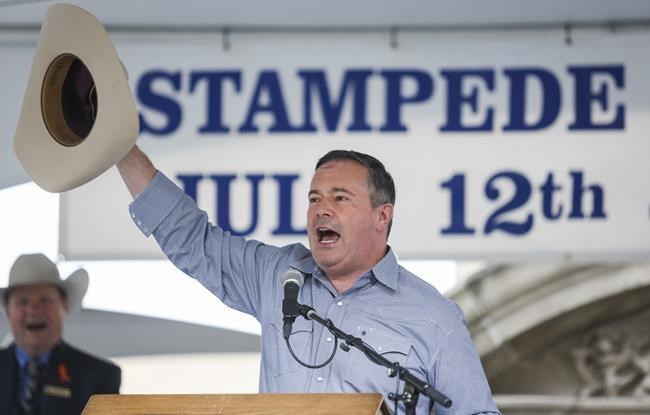CALGARY — As the lights dimmed and the music started pumping at Calgary's Home and Away sports bar last weekend, owner James Martin felt something he hadn't in a long time — hope.
The bar was maybe 60 to 70 per cent full, nothing like the pre-pandemic days when a big game or a corporate Christmas party would result in a packed house. But since Alberta lifted all COVID-19 restrictions on July 1, Martin has seen a slow but steady increase in customers. The July 9 kickoff of the 10-day Calgary Stampede, just a five-minute walk away, has provided an extra boost as cowboy boot-wearing customers trickle in looking for a drink.
"We had a dance floor of people singing along to songs Saturday night and it was awesome," Martin said. "It just had me feeling super positive."
Martin isn't the only business owner in Alberta sensing a glimmer of light these days, at the end of what has been a long tunnel. Like everywhere else in Canada, Alberta's business community has spent the past 16 months grappling with COVID-19 public health restrictions and mandatory closure orders.
But in Alberta, the pandemic's effects have been amplified by the collapse in oil prices last year. The province's economy shrank 8.2 per cent in 2020, according to Statistics Canada, making it the hardest hit province in the country. Recovery has been slow — while the Canadian unemployment rate fell from 8.2 per cent to 7.8 per cent in June, Alberta's unemployment rate jumped to 9.3 per cent from 8.7 per cent. The province is still short about 50,000 jobs from where it was when the pandemic began.
“It’s been tough for a little while now, and obviously the last year and a half has been even tougher," said Ben Gerwing, president of Alberta Boot Company, an iconic Calgary store that specializes in handmade Western boots and has outfitted politicians, celebrities and even royalty.
Gerwing said business has been challenging for seven years, ever since the 2015 oil-price crash plunged the province into two years of recession. It was easier to sell high-end cowboy boots in 2014, when oil surpassed US$100 a barrel and exuberant corporate Stampede parties were the norm.
"If you're in Calgary or Alberta for that matter, even if you're not in the oil and gas industry, you're in the oil and gas industry," he said.
That's where Gerwing, like Martin, sees signs of hope. It's not just the rollout of vaccinations and the lifting of public health restrictions that businesses are celebrating, or the fact that a slightly subdued version of Stampede has gone ahead this year. The event, which generated $227 million in Calgary in 2019 according to a report by the Conference Board of Canada, was cancelled due to COVID-19 in 2020 but is taking place this year with some modifications and about half of normal attendance.
What businesses are also watching is the price of oil, which has taken off as economies around the world reopen and travel begins to resume. On Tuesday, the benchmark West Texas Intermediate crude price closed at US$75.25 a barrel, up from the low $30s in April 2020 and approaching a high that hasn't been seen since 2014.
Roger Tang — chief executive of Calgary-based Deltastream Energy Corp., a privately held oil and gas exploration company — said the mood in the oilpatch is still cautious, but many companies are starting to ramp up production.
"Lots of people are starting to talk about drilling more wells," Tang said. "If that happens, the well-service companies will also benefit — from being in a depressed market the past seven years and having to lay off people, to now looking to hire them back."
A report earlier this month from CIBC Capital Markets predicted Alberta will lead the country in economic growth this year, with forecast real GDP growth of 7.9 per cent. That same report predicted the province's unemployment rate will be 8.5 per cent in 2021, still elevated from 6.9 per cent in 2019.
It will take time for Alberta's energy sector to recover from seven years of cost-cutting, and long-term expansion of the sector remains constrained by an ongoing lack of pipeline capacity. It will also take time for small businesses to recover from the devastating impact of COVID-19, but Tang said he believes many in Calgary are feeling sunnier than they have in some time.
“I think all of these factors coincide," he said. "Better industry, a better economic outlook, Stampede week — which is the highlight of Calgary every year and last year we didn’t have one — I think all of these things are certainly making a lot of people happy."
At Calaway Park, a family amusement park on the edge of the city, spirits are up, said general manager Bob Williams. International visitors haven't returned yet, and the on-site campground is only 60 to 80 per cent full. But Williams said visitor spending on everything from concessions to games is up from last year, and he's optimistic about the future.
"I’ve been exit greeting the last few nights, and people are happy. We’re seeing a much different mood this year than we saw last year," Williams said.
"There just seems to be a little more jump in their step this year than we’ve seen.”
This report by The Canadian Press was first published July 14, 2021.
Amanda Stephenson, The Canadian Press



